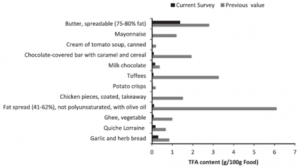Reformulation revolution: Trans fatty acids records big drop in UK foods since 2007
 UK government survey has found levels of trans fats in a range of processed foods has fallen considerably since 2007 thanks to industry reformulation efforts.
UK government survey has found levels of trans fats in a range of processed foods has fallen considerably since 2007 thanks to industry reformulation efforts.
Now it is mainly naturally occurring trans fats that are found in UK foods as artificial trans fats were cut around 75% since 2007.
Natural trans fats are derived from ruminant animals such as cows and lambs and can occur in meat and dairy products.
The more common artificial trans fats come from industrial hydrogenation of vegetable oils and were previously widely used in processed foods for shelf-life, taste and texture purposes until a 1990s report linked trans fat rich diets to increased risk of coronary heart disease.
Where are levels highest?
A consortium that included the Institute of Food Research and a division of UK government’s Department of Health last week published an analysis of trans fat levels in 65 samples of various foods including pizza, garlic bread, confectionery, snacks, fats and spreads.
They found that concentrations of trans elaidic acid, the most predominant artificial trans fat, averaged at 0.2g/100g of food. Levels from six food categories including butter and battered cod collected in 2007 found an average elaidic acid concentration of 0.08g.
The highest concentration in the latest survey was found in cod fried in batter from takeaways followed by chips in takeaways.
The next highest levels were in dairy ice cream, garlic and herb baguettes, spreadable butter and pizza.
Natural trans fats: Health risk?
The report said: “The results show that levels of artificial trans fats in processed foods have reduced considerably
compared with previous analyses of similar foods carried out over the last 20-30 years where available. Where samples contain higher levels of trans fats this is generally due to the presence of natural sources of trans fat in the product (eg dairy sources).”
“The health implications of ruminant trans fatty acids compared with industrial trans fatty acids are not clear but the low levels found in this survey are unlikely to be associated with increased risk of coronary heart disease.”
Removing trans fats
Over the past decade, the industry has been voluntarily working on removing trans fatty acid. Removal strategies have included using blends of oils such as palm, sunflower or rapeseed oil and processing techniques such as fractionation and interesterification.
In 1994, the UK Department of Health recommended that trans fatty acid consumption should not be above 5g/day or 2% of food energy.
A study published last year found that US population between 2003 and 2006 averaged 1.3g per person per day.
The UK’s Foods Standards Agency (FSA) found in 2007 that industry reformulation efforts had reduced trans fats to a minimum of 1% of food energy.



































